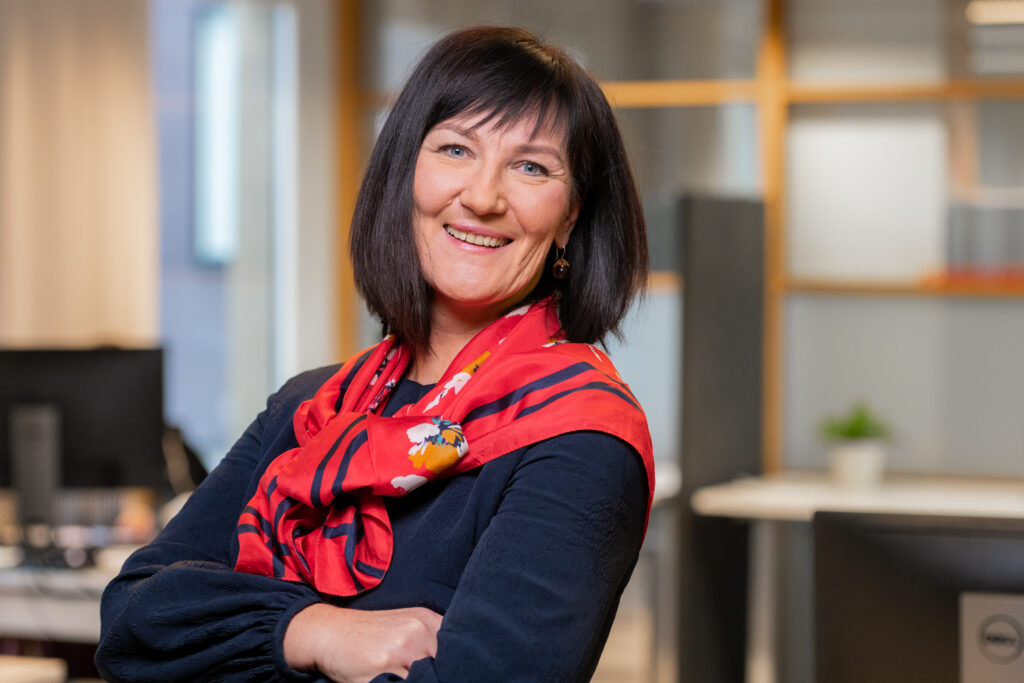April 2021
In boosting businesses, we could spurt like Ferraris, but we’re moving at Turtle speed

The analysis of the use of funds and current tendencies in the country’s economy leads to the obvious conclusion that we use the available financial resources in Lithuania in a too conservative way, and, instead of the opportunity to exploit the situation and spurt at the capacity of Ferrari, we choose a safe but a very slow growth at the speed of a Turtle.
From a psychological point of view, the situation is understandable, since along with the usual risks – commercial, technological and many others, business today faces the biggest challenge of regulation.
Recalling the lessons of 2009-2011 crisis, both business companies and banks more often ground the management of their economic situation on risk minimization. In other words, for reasons of caution, they would rather not grant a loan than allot time for a more thorough analysis of the situation.
However, a qualified and comprehensive risk management provide opportunities for business development, especially now, when we have a sufficient number of automated management tools based on data.
Several weeks ago, a survey carried out by the Bank of Lithuania (LB) showed that at the present moment, a more careful consideration should be given to hotels, restaurants, and part of real estate companies. However, the significantly reduced or discontinued funding has had a negative effect on an absolute majority of business sectors whose situation during the pandemic has not gotten worse and has even improved.
Capital adequacy is good, but a reluctance to lend money remains
Responsible lending constitutes the backbone of any economy, and Lithuanian business has learned to take a responsible attitude to loan repayments. For example, Lithuania is marked out among other countries of the European Union (EU) by the smallest – only 3% of all loan portfolio – part of business enterprises which have made use of a moratorium on loans declared in the spring of 2020.
In addition, according to the Bank of Lithuania, part of non-performing loans has been regularly decreasing and now has reached the lowest historical level of 1.5%. In other words, in their concern about high credit ratings and a good financial reputation, the enterprises are doing their utmost to repay both loans and interest on time.
With full knowledge of the aforementioned facts, what surprises, is a particularly prudent financing of business or strict conditions of granting loans, especially taking into account the fact that the population’s and enterprises’ deposits have reached record heights on a global scale. In Lithuania, the capital adequacy ratio of the bank sector having reached the highest bar of 25% in 2015, has remained at the top and currently fluctuates at around 22%.
The situation is changing dynamically, but every company must be evaluated separately
On the other hand, the analysis of the financial situation of enterprises warns that the situation in the market is changing dynamically. For example, if in 2020, 11% of enterprises entered the highest and high classes of bankruptcy risk, this year there are 17% of such enterprises. There is a greater probability that part of enterprises may fall behind on their payments. For example, in 2020 a high and the highest risk of payment delays was attributed to 18% of companies, however, this year the number of such enterprises has increased by 31%.
And still, the analysis of separate sectors provides more clarity. For example, the number of construction companies of high and the highest classes of risk has risen over the year from 19 % in (2020) to 23% in (2021). And in the transport sector from 15% to 23% respectively. A greater emphasis should be laid on the situation of trading companies. The companies of this sector have split into two blocs – companies whose activity was restricted and the financial situation was getting worse, and the ones whose situation was changing for the better.
Unfortunately, in the catering sector the situation is still the worst. Last year 30% of these companies were classified as having high or the highest risk, and this year this figure reached 45%. However, it is believed that a gradual loosening of business restrictions would enable the recovering of this sector.
The services sector is now doing well, – part of its enterprises of high and highest risk remains moderate, although it has increased by 6% to 9%. Every enterprise must be evaluated individually, and if the financial position and discipline are strong, there are no reasons for the discontinuation of financing such businesses.
We are living in many-speed economic conditions. When some enterprises are made to stop their activity, others experience a boom and have successfully moved their business to digital space. The EU business support measures have deferred the declaration of bankruptcy for part of enterprises. However, the situation can change even more dynamically when the states‘ support is withdrawn. This aspect makes one carefully supervise one‘s business partners, require quarterly financial reports, a record of the quality of transparent property and its declaration.
What rules would I most recommend to comply with? The enterprises which have the experience of assessing their partners, know that information in credit bureau systems which is updated every day, includes tens of various indicators, and algorithms which calculate creditworthiness and risk, evaluate more than 100 different parameters. However, at present, in evaluating the new partners‘ financial statements, activities or shareholders‘ business relationships, I would suggest paying particular attention to negative information. Check if there are no court actions, if the number of employees has not drastically decreased, and if there are no recorded arrears. Under the conditions of big flow of information your business could be assisted by an early warning system which would allow to see the threatening changes and thus, react immediately.
We have a sufficient number of tools of risk management, it is time to make a more efficient use of capital
Current technological innovations make it possible to both disclose and find information about the buyer‘s or partner‘s debts during a few seconds. Normally, the essential information about overdue payments is freely available. Therefore, I would urge again that every granting of credit should be considered separately. Evaluating the aforementioned figures, it becomes obvious that we have not used great possibilities to help economy recover as soon as possible. Guarding ourselves against a very small part of unreliable debtors, we punish a far bigger part of disciplined businesses.
An operative exchange of information about debtors could assist us and others in making more precise and quicker decisions as well as preventing a domino effect, when the debt of one enterprise establishes the whole chain of overdue payments.
Let us go back to strategies of a Turtle or Ferrari. There are different tools of risk management. It is possible to insure oneself against taking on any risk. In this case the enterprise will grow slowly.
Or, on the contrary, one can use all the capacities and possibilities of Ferrari. This car has not only fast acceleration and high speed, but also a well-operating brake system which in business, is analogous to data-based risk management.
There is no doubt that crediting must be responsible and take into consideration all the risks. However, at present there are enough reliable tools which assist in making optimal decisions. Therefore we can better employ capital, promote the country‘s business and stimulate its economy.
Jekaterina Rojaka,
Chief Commercial Officer,
Creditinfo Lithuania
Creditinfo Group enters collaboration with Společnost pro Informační Databáze (SID) in Czech Republic

Czech Republic, Prague, April 22nd 2021- Creditinfo Group, the leading global credit information and decision analytics provider, and Společnost pro informační databáze (SID), service provider of SOLUS Credit bureau, have agreed to partner in the areas of data transformation, decisioning engines, data analytics and scorecards development. The agreed partnership enables SID to use the global credit risk management expertise of Creditinfo Group as well as its solutions and analytical capabilities to better service members of SOLUS Credit bureau, one of the two largest credit bureaus in the Czech market.
“We are proud to have been chosen by SID as it’s partner for members of the SOLUS credit bureau and are looking forward to leverage our global experience as well as presence of our group IT development, global data analytics, and consultancy centre in Prague for Czech banks and financial services players, members of the SOLUS credit bureau” says Seth Marks, Regional Director of Creditinfo Group.
“With Creditinfo Group we materially strengthen our portfolio of software, decisioning and analytical solutions available for both SOLUS members and for the wider Czech financial sector. Connecting its global experience with our strong local presence in the Czech market enables our existing and new customers to further increase efficiency and including improved credit risk decisioning speed, says Ján Hurný, CEO of SID.
– Ends-
About Creditinfo
Established in 1997 and headquartered in London, UK, Creditinfo is a provider of credit information and risk management solutions worldwide. As one of the fastest-growing companies in its field, Creditinfo facilitates access to finance, through intelligent information, software and decision analytics solutions.
With more than 30 credit bureaus running today, Creditinfo has the most considerable global presence in this field of credit risk management, with a significantly greater footprint than competitors. For decades it has provided business information, risk management and credit bureau solutions to some of the largest, lenders, governments and central banks globally to increase financial inclusion and generate economic growth by allowing credit access for SMEs and individuals.
For more information, please visit www.creditinfo.com
About SID
SID is an exclusive service partner and facilitator of SOLUS credit bureau, one of the two largest credit bureaus in the Czech Republic with more than 50 members from banks and financial services. SID enables efficient data exchange among bureau members thus strengthening their insights and decisioning capabilities. More information are available on www.sid.cz and www.solus.cz
Creditinfo Group Awarded World Bank Tender

São Tomé and Príncipe, São Tomé, 19th, April 2021 – Creditinfo Group, the leading global credit information and decision analytics provider, today announces that it was awarded a tender by the Central Bank of São Tomé – represented by AFAP (Agencia Fiduciaria de Administracao de Projectos) who will be handling a project on the delivery and support of Public Credit Registry, financed by the World Bank.
Sao Tome is working with the World Bank with the aim of improving the financial infrastructure in the market, increase access to finance and enhance market stability. Creditinfo has already supported many markets in achieving this goal and was identified as a trusted and reliable partner.
Creditinfo will provide CBS (Credit Bureau Solutions), including Value-Added Products such as the Statistical Score, MyCreditinfo, Benchmarking and Monitoring – the latest and modern cutting-edge products and services in the credit industry, to help the Central Bank of São Tomé in implementing the Public Credit Registry.
Samúel Ásgeir White, Director of Direct Markets, Creditinfo Group is excited about this opportunity. “The important part is the knowledge transfer and our active approach – direct help to the Central Bank of São Tomé, with the whole implementation process of our modern services in São Tomé and Príncipe, since we have years of experience from the Central Banks around the world that we provide the same products and services to,” he said.
The competition was organized by AFAP as a fiduciary agency responsible for the management of the World Bank’s financial support, in favor of the Central Bank of São Tomé and Príncipe as a borrower, with Creditinfo being elected as winner, among 4 bidders.
On behalf of AFAP, Carlos Bonfim, technical advisor, intervened to congratulate on the conclusion of the contract with Creditinfo, a company whose references allow the prospect of a satisfactory result regarding the updating of the credit risk center of the Central Bank of São Tomé and Príncipe. He ended by expressing the wish that the quality of the partnership between all stakeholders will continue, in order to create a favorable cooperation climate for the implementation of the project.
-Ends-
About Creditinfo
Established in 1997 and headquartered in London, UK, Creditinfo is a provider of credit information and risk management solutions worldwide. As one of the fastest-growing companies in its field, Creditinfo facilitates access to finance, through intelligent information, software and decision analytics solutions.
With more than 30 credit bureaus running today, Creditinfo has the most considerable global presence in this field of credit risk management, with a significantly greater footprint than competitors. For decades it has provided business information, risk management and credit bureau solutions to some of the largest, lenders, governments and central banks globally to increase financial inclusion and generate economic growth by allowing credit access for SMEs and individuals.
For more information, please visit www.creditinfo.com
About AFAP
AFAP was created in 2004 with the aim of managing funds made available by the technical and financial partners of the Government of São Tomé and Príncipe, of which the World Bank stands out in particular. It has an effective and motivated team and is respectful of the best practices for regulating tenders, and today has a portfolio of projects and partners in constant growth. Within the framework of its performance, the main projects such as the installation of fiber optics in Sao Tome Principe to provide high-speed internet services, education and health for all, improvement of the energy system can be cited as an example of success. electricity, namely hydrocentrals, introduction of alternative energies as well as rehabilitation of main roads, etc.
For more information, the following AFAP website can be viewed: www.afap.st
How Creditinfo supports Fintechs

The COVID-19 crisis had a profound financial and social impact across the globe, with several different industry sectors impacted. Curfews limited the effective utilization of physical branches, forcing financial services firms to turn to online channels. Few organizations were ready to make the transition to ‘digital lending’ smoothly, but this is where the Fintechs excelled. Capitalizing on their technical competencies, agility, and focus on specific niches they triggered substantial advances in online lending – ranging from streamlined, friction free customer experience to KYC processes.
Instead of focusing on internal operational efficiencies like traditional banks, Fintechs driving digital lending started to construct an ecosystem of services that evolved around their customers. Regulators, who have been observing the significant growth of digital lending started to weigh in; either requiring compliance with existing regulations or developing new regulations to be met. These steps had a wide-ranging impact from data quality to having a prudent credit risk management framework, including analytics, risk management tools, policy and procedures.
Creditinfo is well positioned to support Fintechs, helping them remain focused on providing an outstanding customer digital lending experiences, while ensuring a proven credit risk management framework. Our approach consists of 4 key services:
- Data: the first step to perform a credit risk assessment is done by collecting all relevant Depending on circumstances, this can be traditional (Credit Bureau) or non-traditional (transactional) data. Data quality checks need to be performed to derive the maximum insight from it. Operating in 45 countries and providing Credit Bureau services in 23 of them, we define industry standards on data quality. We know how to combine traditional and non-traditional data to be used in decisioning that meets your risk appetite.
- Analytics: deriving insight from data is our expertise. Our highly predictive models underpin objective, prudent credit risk decisions. By combining non-traditional and traditional, we are able to improve predictive power by over 50%.
- Decisioning: implement your scorecards with ease in our decisioning system. Streamline and eliminate manual processes to ensure quick and consistent decisions to your customers, providing you a competitive edge.
- Business know-how: we know how to adapt global best practices within your local environment. We are ready to discuss with you how we have improved lending for one of our customers by over 20% or reduced non-performing loans by 15%.
Please get in touch with us to discuss how we can make a positive step change in your business.
Creditinfo granted AISP license, launches intermediary service

On Monday, April 5th, the Financial Supervision Authority issued AS CREDITINFO EESTI with an account information service provider (AISP) license. This license allows the company – which has a strong history of more than 25 years mediating credit and business data – to act as an intermediary between institutions, providing read-only access to bank account information in order to enable the delivery of mutually beneficial services to account holders.
Creditinfo now has the ability to provide bank account owners in Estonia with access to new, enhanced services from authorized companies, such as those providing loans or payment-by-installment options, by sharing information from their account statement.
This sharing of balance and transaction data takes place in an automated form that makes the process of applying for credit or payment-by-installment significantly easier and faster for both the owner of the account and the service provider.
“We are always looking for opportunities to expand our business and better serve our customers in order to remain the most reliable, strong and innovative business partner to both individuals and companies in this fast-evolving field,“ Ege Metsandi, CEO of Creditinfo Estonia explained. “The whole area of assessing creditworthiness and solvency is moving toward automation, so credit decisions can be made as quickly and reliably as possible. The greatest added value here can be created by combining high quality data and the best technological solutions. Creditinfo with its long history and international network is leading the way in both of these areas. With this new AISP license, we can be an even better partner to our customers by helping to further de-risk lending and provide better access to appropriate financing for their specific needs“ Metsandi added.
Law firm WALLESS advised Creditinfo throughout the application process for the AISP license.
AS Creditinfo Eesti is the largest company providing business information and risk management services in Estonia. First founded in 1993, the company has been an affiliate of Creditinfo Group since 2016.
Additional information:
Ege Metsandi
CEO and board member of Creditinfo Estonia , Email: ege.metsandi@creditinfo.ee
Tel: (+372) 5078172




